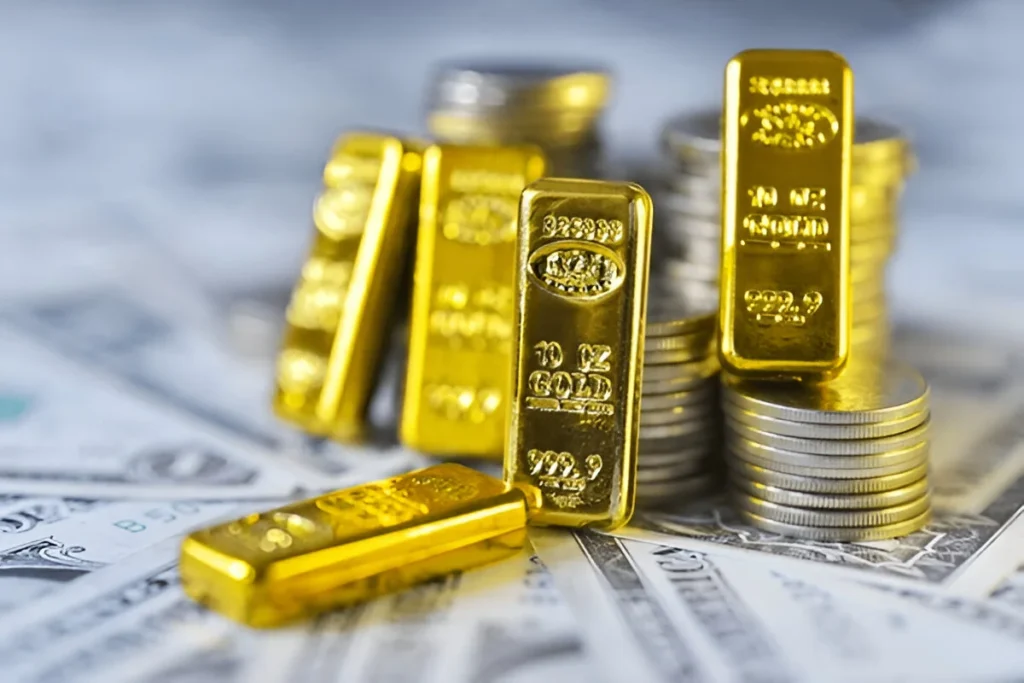RahulRefinery
10.02.2025
Economic Role of Gold: How Gold Helps Shape the Economy?
Hello Reader!
Welcome to the blog page of Rahul Refinery, one of the best gold seller in Kolkata.
Gold has been an essential part of human civilization for centuries, serving as currency, a symbol of wealth, and a store of value. Its significance extends beyond personal investment and jewelry—it plays a crucial role in shaping economies worldwide. At Rahul Refinery, the best gold seller in Kolkata, we understand the importance of gold in both personal wealth and national economies. Let’s explore the economic role of gold and how it impacts global and local financial systems.
Table of Contents

1. Gold as a Store of Value
One of the most fundamental economic roles of gold is its function as a store of value. Unlike paper currency, which can depreciate due to inflation, gold retains its purchasing power over time. This makes it a preferred asset for investors looking to hedge against economic uncertainty. Many central banks across the world stockpile gold as a reserve asset to maintain economic stability.
2. Gold and Inflation Protection
Gold is often referred to as an “inflation hedge.” During times of high inflation, the value of fiat currency declines, but gold prices tend to rise. This relationship makes gold an attractive investment for individuals and financial institutions. At Rahul Refinery, the best gold seller in Kolkata, we provide high-quality gold for investment, ensuring our customers safeguard their wealth against economic fluctuations.
3. Gold as a Safe Haven Asset
In times of economic crises, geopolitical tensions, or stock market downturns, investors flock to gold as a safe-haven asset. The demand for gold rises during financial instability, leading to an increase in its price. This role of gold is crucial in maintaining investor confidence and providing financial security.
4. Gold’s Role in International Trade and Reserves
Many countries hold gold reserves as part of their foreign exchange reserves. These reserves act as a financial buffer during economic downturns and can be used to stabilize a nation’s currency. The economic role of gold in international trade is evident in its use as a medium for settling global transactions and maintaining liquidity.
5. Gold and Employment Generation
The gold industry contributes significantly to employment and economic growth. From mining and refining to selling and investing, the gold sector provides jobs to millions of people worldwide. At Rahul Refinery, the best gold seller in Kolkata, we not only trade in gold but also contribute to the local economy by creating employment opportunities in the gold industry.
6. Gold in Jewelry and Consumer Markets
Apart from its financial role, gold is an integral part of the jewelry industry, particularly in countries like India, where it holds cultural and traditional significance. The demand for gold jewelry boosts economic activities in manufacturing, retail, and export industries.
7. Gold and Investment Diversification
Investors include gold in their portfolios to diversify risks. Since gold often moves independently of stock markets and other financial assets, it provides a balance that reduces overall investment risks. The availability of gold in various forms—bullion, coins, ETFs, and digital gold—makes it accessible to all types of investors.
8. The Role of Gold in Strengthening Currency Stability
Gold-backed currencies were once the foundation of many national economies. While most currencies today are fiat money, the presence of gold reserves strengthens the credibility of a nation’s economy. Countries with substantial gold reserves are often seen as financially stable, which positively impacts investor confidence.

How does gold mining contribute to local economies?
Gold mining contributes to local economies through job creation, tax revenue, and investment in local communities. Mining companies often invest in infrastructure and utilities, such as roads, water, and electricity supplies, benefiting businesses and communities long after the mine’s production years. Gold mining can also bring cleaner power to local communities as miners decarbonize their energy sources.
Specifically, gold mining’s contributions include:
- Job Creation: The gold mining industry provides jobs for millions of people worldwide, from miners and engineers to logistics personnel. Every local job at gold mining operations supports six more, or close to ten more if induced jobs are included.
- Tax Revenue: Gold mining generates revenue for governments through taxes and royalties.
- Community Development: Mining companies may invest in social infrastructure, including schools, colleges, and health centers, improving opportunities and wellbeing for local people. They may also provide healthcare services to their workforce and surrounding communities.
- Infrastructure Development: Gold mining companies invest in infrastructure and utilities, such as roads, water, and electricity supplies.
- Economic Growth: Gold mining can stimulate economic growth in communities, leading to improvements in the standard of living for residents. The influx of mining activities generates stable incomes and creates business opportunities, enhancing local prosperity.

What are the socio-economic benefits of gold mining?
Gold mining provides several socio-economic benefits to local communities and host countries. These benefits include job creation, tax revenue, community development through infrastructure, healthcare, and education improvements, and overall economic growth.
Specific benefits:
- Job Creation: Gold mining provides direct and indirect employment opportunities. Every local job at gold mining operations supports six more, or close to ten more if induced jobs are included.
- Tax Revenue: Gold mining generates revenue for governments through taxes and royalties. In 2020, World Gold Council (WGC) member companies directly paid US$8.7 billion in employee wages and US$7.6 billion in tax payments to governments in 38 host countries.
- Community Development: Mining companies often provide infrastructure, such as roads and hospitals, and support education and training programs for local residents. Gold mining companies can focus resources on improving healthcare in local communities, which can help minimize absenteeism and reductions in productivity due to workforce illness.
- Infrastructure Development: Gold mining companies invest in infrastructure and utilities, such as roads, water, and electricity supplies.
- Economic Growth: Gold mining can stimulate economic growth in communities, leading to improvements in the standard of living for local residents. The direct economic contribution of the gold mining industry to the global economy has increased almost seven-fold in the period from 2000 to 2013.
Gold mining can significantly and positively impact the economies of the countries in which it takes place and the lives of the citizens of those countries.

How does gold influence monetary policy?
Gold influences monetary policy through its impact on inflation, currency value, and as a store of value during economic uncertainty. Here’s a breakdown of the key mechanisms:
- Inflation Hedge: Gold is considered an asset that can hedge against inflation. As inflation decreases the value of currency, gold serves as a store of value. Investors typically buy gold when their country is experiencing high levels of inflation. The demand for gold increases during inflationary times due to its inherent value and limited supply.
- Currency Value: A country that exports gold or has access to gold reserves will see an increase in the strength of its currency when gold prices increase, since this increases the value of the country’s total exports. An increase in the price of gold can create a trade surplus or help offset a trade deficit.
- Monetary Policy Tool: Central banks’ gold purchases can affect the supply and demand of the domestic currency, potentially leading to inflation. This is because banks may print more money to buy gold, creating an excess supply of fiat currency.
- Interest Rates: Changes to monetary policy, like adjustments to the target federal funds rate, can impact gold prices. Frequently, when rates increase, gold generally increases in value, and when the Federal Reserve reduces rates, the price of gold tends to stagnate or decline. Monetary easing boosts gold by lowering the opportunity cost of holding it. When central banks lower interest rates, the yields on traditional interest-bearing assets decline, making non-interest-bearing assets like gold more attractive.
- Quantitative Easing and Tightening: When economic conditions are poor, the Federal Reserve may respond with quantitative easing, purchasing bonds and other fixed-income assets. On the other hand, when inflation levels are high, the Fed takes part in quantitative tightening, which can lead to higher bond rates. These actions can influence gold prices, though the impact isn’t always predictable.
Overall, gold’s role as a haven investment and its relationship with inflation and currency values make it a significant factor influencing monetary policy decisions.
Also Read: Why Sell Gold to a Government-Authorized Gold Buyer in Kolkata?

What role does gold play in financial market stability?
Gold plays a multifaceted role in financial market stability, acting as a hedge against inflation, a portfolio diversifier, and a safe-haven asset during times of economic uncertainty.
Key Roles:
- Hedge Against Inflation: Gold is known for retaining its value during periods of inflation or currency devaluation, protecting investors from loss of purchasing power. Investors often increase their demand for gold during inflationary times because its value is inherent and its supply is limited.
- Portfolio Diversification: Gold has a low or sometimes negative correlation to traditional assets like equities and bonds. Adding gold to an asset allocation can enhance the risk-return profile of a portfolio.
- Safe-Haven Asset: During financial crises and economic downturns, investors tend to seek safe-haven assets like gold. Increased demand for gold during these times can lead to price increases. However, one study suggests that gold’s role as a haven in India is minor, except during events like the Covid-19 pandemic.
- Stabilizing the Banking System: Gold is trusted by many and can strengthen proprietary balance sheets, further enhancing the attractiveness and appeal of the banking system.
- Influence on Currency Value: A country that exports gold or has access to gold reserves may see its currency value increase when gold prices rise, as this increases the value of the country’s total exports.
Gold ETFs
Gold ETFs can foster stabilization through immediate liquidity provided to support price discovery. Transparent regulation and decent trading systems might help in promoting confidence in using these instruments.

How does the price of gold affect inflation rates?
Gold’s price movements can signal where investors think inflation is heading, even before official numbers are released. This predictive pattern is driven by real interest rates, investor sentiment, and Federal Reserve policies.
Here’s a more detailed breakdown:
- Inflation Expectations: Gold prices often reflect investor expectations about future inflation. If investors anticipate rising inflation, they may buy gold in anticipation, driving up its price.
- Real Interest Rates: Gold prices tend to have an inverse correlation with real interest rates, which reflect market conditions and inflation expectations. Investment analyst Trevor Yates at Global X notes that the market is currently pricing in higher for longer inflation, and this, along with the FOMC easing expectations, should push real rates lower and benefit the gold price.
- Safe-Haven Demand: Demand for gold tends to increase during times of high inflation as investors seek safe-haven assets. The limited supply of gold, unlike fiat currencies, can drive its price higher as demand increases.
- Dollar Denomination: Because gold is generally dollar-denominated, a stronger U.S. dollar tends to drive gold prices lower, and vice versa.
- Money Supply: An increasing amount of money in an economy leads to an increase in consumption and investment, positively influencing the consumer demand for gold and the demand for gold as an investment, thus putting pressure on the price of gold.
However, the relationship between gold and inflation is not absolute. For example, gold didn’t enjoy a good year in 2022 despite record inflation, proving that the correlation between inflation and gold prices isn’t absolute.

FAQ
1️⃣ Why is gold considered important in the economy?
Gold acts as a store of value, a hedge against inflation, and a safe-haven asset during economic crises.
2️⃣ How does gold help in financial stability?
Many countries hold gold reserves to stabilize their currency and maintain investor confidence.
3️⃣ Is gold a good investment during inflation?
Yes, gold prices typically rise during inflation, protecting wealth from currency depreciation.
4️⃣ How does gold impact employment?
The gold industry, from mining to selling, generates millions of jobs worldwide, boosting economic growth.
5️⃣ Where can I buy high-quality gold in Kolkata?
Rahul Refinery, the best gold seller in Kolkata, offers trusted gold buying and selling services.
Conclusion
The economic role of gold is deeply embedded in financial systems worldwide. From serving as a store of value to protecting against inflation and financial crises, gold continues to shape economies. As the best gold seller in Kolkata, Rahul Refinery ensures that individuals and businesses can access high-quality gold for investment and trade. Whether you are looking to buy gold for financial security or personal use, investing in gold remains one of the smartest economic decisions.
For expert guidance on gold investments, visit Rahul Refinery, your trusted partner in the gold industry!



